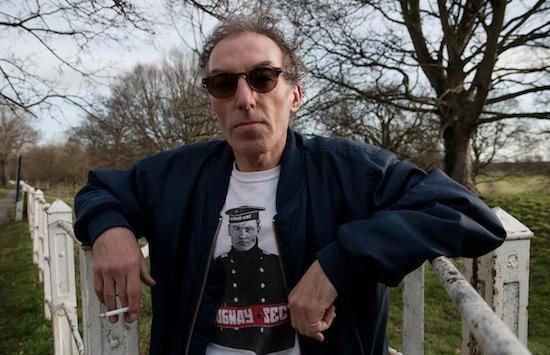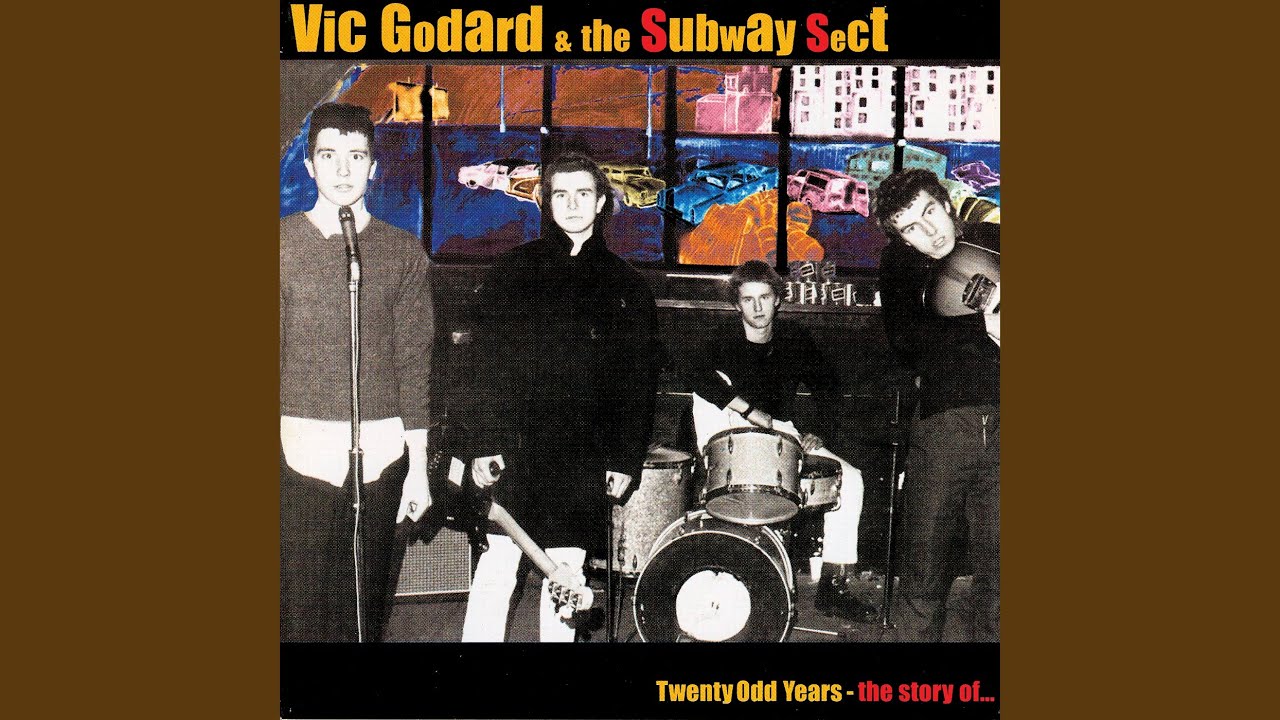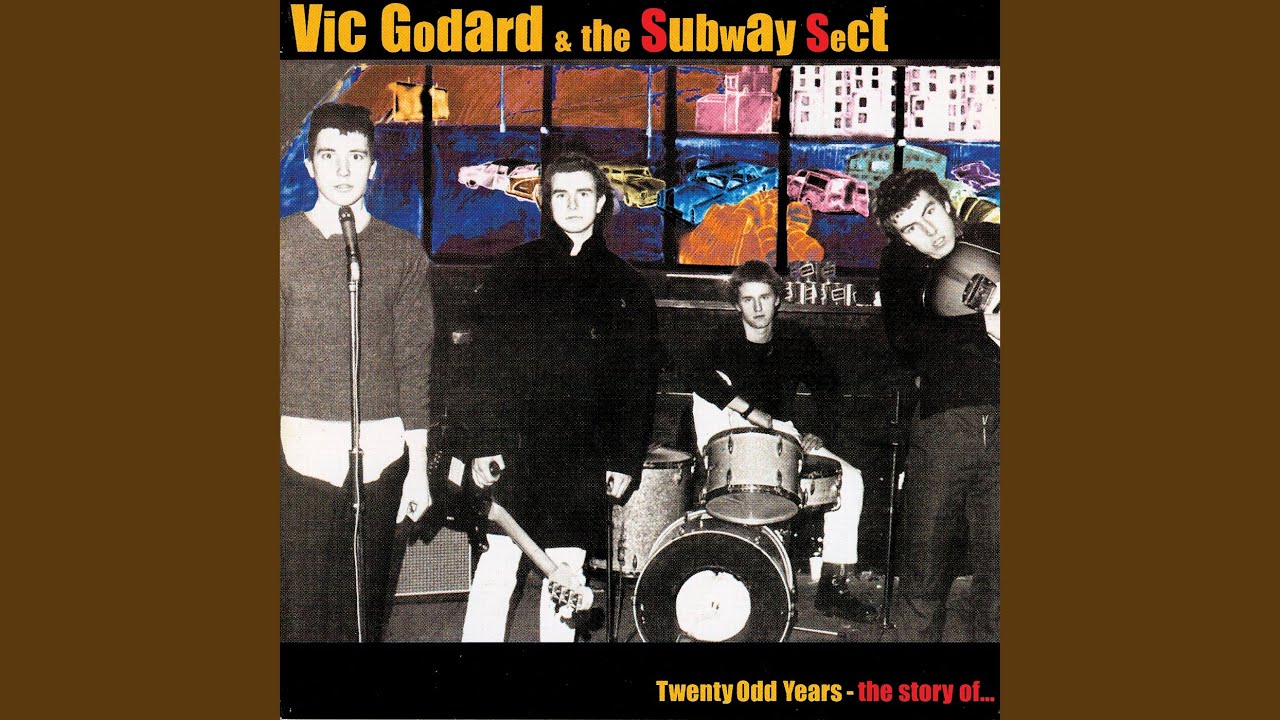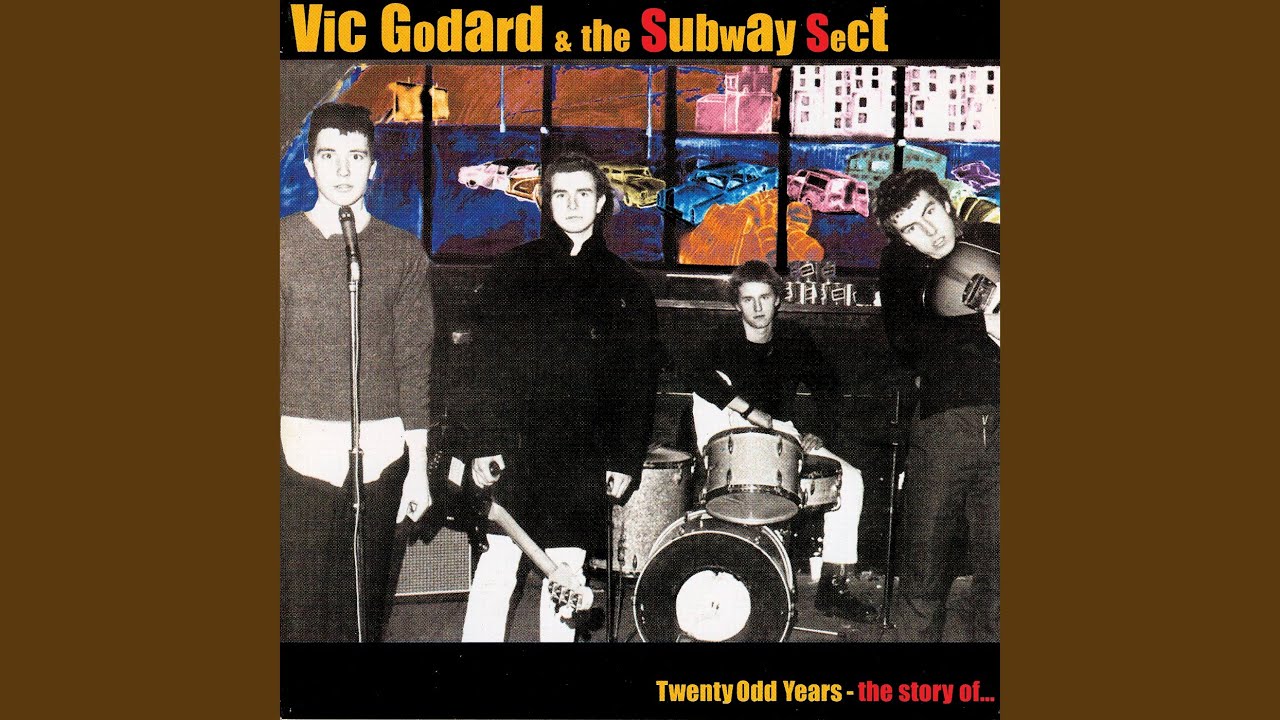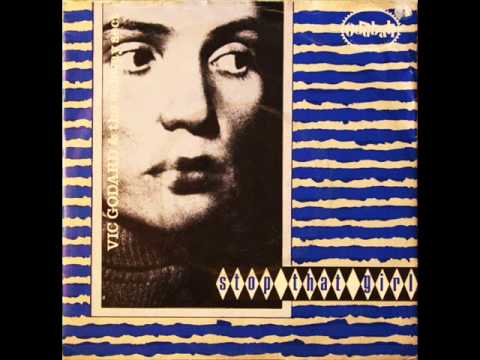Vic Godard, courtesy Alchetron
It would be too easy to describe Vic Godard as a Zelig figure with a serendipitous career. It seems he was always in the right place at the right time. It also seems things just have a habit of coming together for him. But such incidents of happenstance and luck belie Godard’s musicianship and his determination to explore pretty much everything throughout the entire course of his music career.
Born Victor Napper in 1957 – his dad an engineer, his mum a cleaner – in London’s southwest district of Barnes, Napper renamed himself Godard after his predilection for watching late night post-gig French new wave films. Growing up on the likes of Bowie, Velvet Underground and The 13th Floor Elevators, he already had gourmet music tastes from a young age, but when he took up music himself, he became a true connoisseur. Completely self-taught, Godard’s first instrument was a Hofner semi acoustic bass that he bought for £26 in 1976. He learnt by playing along to Tapper Zukie’s ‘MPLA’ and Television’s ‘Little Johnny Jewel’, then later, Talking Heads’ Tina Weymouth.
At an early Sex Pistols gig, Malcolm McLaren – eager to fill out a bill for an upcoming show – asked if Godard and his group of friends were a band. They weren’t, but much like Siouxsie Sioux also recognising the opportunity of a lifetime, that didn’t stop them becoming one overnight. Opening the show at the now legendary 100 Club Punk Festival of 1976 was Subway Sect’s debut performance. The band were so green that they thought the sole purpose of a kick drum was to display a band name rather than provide a beat – until someone queried the absence of their pedal.
Managed by McLaren cohort/competitor and Clash guvnor Bernie Rhodes, Subway Sect quickly carved out a name for themselves both in their sound and image (dressing exclusively in grey to stand apart from their dayglo peers). Then, just as quickly, they left punk behind. They rapidly developed their skills thanks to Godard moving to guitar and fully adopting the influences of Television and those around them at the time, such as the Buzzcocks. Other than a Peel Session and debut single ‘Nobody’s Scared’, the original Sect line-up went undocumented. Housed in a basement in central London’s Chinatown, Gooseberry Studios flooded, meaning the masters of their debut album were thrown in a skip. In 2007, Subway Sect released 1978 Now!, a retrofit of that lost album, historically revised from live bootlegs of the original era.
Following a support slot on The Clash’s White Riot package tour of 1977, things were looking good with a follow-up scheduled on the Buzzcocks’ 1978 Love Bites tour. But with the developing career of The Clash, Rhodes had different ideas for Subway Sect and summarily sacked the whole band to instead keep on Godard as a songwriter. He paid Godard £50 a week – no mean wage at a time when the weekly dole was £13. “That was astronomical,” confirms Godard who had just two weeks to get a new Subway Sect line-up together in time for the Buzzcocks tour. “I think I might have even signed off. I must have done!”
Rhodes had already been impressed by the intelligence of Godard’s developing musicianship, plus his ear for melody and lyrics. An early Subway Sect track was even allegedly re-purposed for The Clash. A shaky lo-fi version of ‘U.S. Cunts’ exists on Subway Sect’s Live And Rare Volume 1. With its unsubtle title and repetitive “fuck the USA” chorus, perhaps in spirit, if not musically it might have informed the last gang in town. “’U.S. Cunts’ was one of our early ones,” confirms Godard. I think Bernard Rhodes probably nicked it and told them to use it. That’s the way I see it. They had a song called ‘I’m so Bored with You’ already so it just needed a minor adaptation and that sounds likes the thing he [Rhodes] would have suggested.”
As the apocryphal story goes, Mick Jones wrote an embittered love song titled ‘I’m so Bored with You’ about an ex-girlfriend. But then Strummer altered it into a political diatribe against American political and cultural hegemony by re-naming it ‘I’m so Bored with the USA’. “Yeah,” says Godard. “Sounds like a Bernie Rhodes thing to me.”
While John Lydon and The Clash also quickly developed their respective sounds following their initial albums, Subway Sect accelerated their own musical evolution to an extreme. Recognising that a need for constant change and development was the most important lesson of punk rock – at all costs. Indeed, new album Moments Like These reworks ‘Commercial Suicide Man’, which could well be Godard’s signature tune. But by passionately prioritising breaking new ground over records sales, Vic Godard and Subway Sect have managed to occupy a no-man’s land by ignoring faddism for the best part of 40 years. The intelligence of Crass but without the dogma, and the musicianship of The Stranglers but without the commerce, Subway Sect were forever destined to be a cult entity. “You follow what you like,” says Godard. “After a couple of years of doing something, that’s it. I was even like that at the post office. I didn’t do one round longer than 18 months, during 30-odd years. I didn’t even do the same job at the same department or depot.”
The net result is a bewilderingly complex Tardis of a discography that moves both forward and back in time, with a revolving door of line-ups and hired hands. Which even Godard agrees with, although as he modestly points out, “James Brown would be a real nightmare though compared to the Sect.” Less of a goldmine of a back catalogue and more The Treasure of the Sierra Madre, it’s a career perfectly capped this year by Subway Sect’s glorious Moments Like These. As Jim Reid of The Jesus and Mary Chain (who covered second Subway Sect’s second single ‘Ambition’ on their 12-inch version of 1985’s ‘Never Understand’) righteously points out, the new album is “Vic reflecting on a lifetime in the music business. It sounds like a record that he had to make and is perfect for now.”
Moments Like These is Godard coming full circle in his career as well as his life. Still living in southwest London, but now just round the bend from Barnes in Kew, he recently retired from his long-serving post office job to care full-time for his dad, who’s approaching the age of 100. Through yet another uncanny coincidence typical of Godard’s career, the album was produced by none other than Clash survivor, Mick Jones (who also plays piano). Moments Like These also reunites the 1980-81 Subway Sect line-up (and subsequent JoBoxers roll-call) with Dave Collard, Chris Bostock, Sean McLusky, and Johnny Britton. The album includes impressively extensive liner notes comprising three separate pieces by Steven Daly, Kevin Pearce, and Stephen McRobbie on the idiosyncratic life and career of Godard.
As Kevin Pearce consummately notes, “The Subway Sect story is one of the strangest, and therefore one of the best.” As the old saying goes, you literally couldn’t make it up. Like the music itself, its beauty is in its unpredictability “I never have anything planned,” says Godard. “All my life I’ve never done that. It’s always been accidental.”
Subway Sect – ‘Nobody’s Scared’ (1978)
Vic Godard: I used to hate this record. When I hear it now, I think it sounds like nothing on Earth. There isn’t another group who sounds like that. We didn’t sound like that either – shortly after. It was totally different to what we were trying to be, but in doing so, it’s become totally unique. We were trying to sound like The Modern Lovers, but it doesn’t sound anything like them at all! The photo on the sleeve was shot in Rehearsal Rehearsals. Bernie told us to sit on the floor and have a picnic. He already had the London Transport picture. He was a big collector of posters and that’s what he used for his covers. I don’t know how he did that. It’s really clever.
This was one of the songs you played at the 100 Club Punk Festival in 1976. What do you remember of it?
VG: I couldn’t believe how many people were there. We got to the soundcheck and there was a queue of people round the block already. We saw every gig the Pistols had done in London up until that and they were never full. Then it just totally changed overnight. It was terrifying for us because we’d never performed live. Except in front of Malcolm McLaren at Manos Rehearsals – round the corner from his shop in Chelsea. It was really packed. ‘How the hell did they know about this?’ That’s what I thought. Because up until then, it was difficult to find out where the Sex Pistols were playing, because it wasn’t usually advertised anywhere. Siouxsie was at all the gigs too. I remember Sid had to borrow our drums because no one would lend him a kit and then they did this fantastic off-the-cuff thing [an improvised 20-minute version of ‘The Lord’s Prayer’]. Really good. It was quite difficult for us to be the first band on. I think we set it up well for Siouxsie to go on and do that. She was definitely the thing of the night – she was outstanding.
Subway Sect – ‘Rock And Roll Even (A Different Story)’
from ‘Ambition’ b-side (1978)
VG: Bernard Rhodes used to cannily put records out when you were on a tour so that you didn’t know what was going on. On this occasion, he loved the song but he didn’t like the title. It was called ‘Rock And Roll Even’. He said, ‘You can’t call a song that, it’s too good a song to call that. Why don’t you call it ‘A Different Story’?’ And I said, ‘Well… why?’ He said, ‘Well, it’s in the lyrics and it’s a better title’. I’m not into arguing about things like that, so I said, ‘Fair enough, I don’t really mind what it’s called’. That was meant to be the A-side of the single – not ‘Ambition’. But Bernie said ‘Ambition’ should be the A-side. I’ve always preferred ‘A Different Story’, I’ve never liked ‘Ambition’. It probably did better with ‘Ambition’ on the A-side than it would have done with ‘A Different Story’. It did well, anyway. It sold 20,0000 immediately, so we’ll say he got it right.
It has a kind of indie feel. Were Subway Sect the first indie band?
VG: From the point of view of the sound, yeah, probably! Because when you think about all the other punk bands, they’re not like that, are they? They’re all very rock like Ramones-type groups. But then you did have Talking Heads and Television, so you would have to say the indie sound started with them. But maybe we were the ones who got it into England. All the other punk groups weren’t really following Talking Heads and Television, they were more of a Ramones sound. We got an English take on what Television, Talking Heads and Jonathan Richmond were doing. A lot of indie groups did take that blueprint later on.
Both of these singles came out just after the 1977 White Riot tour with The Clash. What was that like to be on as a teenager?
VG: The tour was a great experience. I was in the middle of a degree in European Studies at Ealing Technical College. I just upped and left after a year and a half and they didn’t know where I’d gone. I sent them a letter from the Grand Hotel, Birmingham halfway through the tour saying that I was really sorry, but I didn’t have time to say because it all happened so quickly. That didn’t go down well. They threw me out in the end. We instantly bonded with The Prefects. Robert Lloyd is always telling this story about me flicking matches at The Jam’s union jack backdrop on the tour. I don’t remember. But we weren’t happy with it. I remember that Rob Symmons, our guitarist was really stubborn – in a good way – and he said, ‘I don’t think we should go on with those’. So he went up to Bernie and said, ‘Look, we don’t want to do the tour anymore because of the union jacks all over the place.’ So Bernie actually had a word with The Jam and got them to take them down, just so that we would stay on the tour. We had no problem with The Jam having union jacks, but we wanted them out of the way when we were on, so we didn’t look like British National Party members.
Subway Sect – ‘Enclave’ from What’s The Matter Boy (1980)
VG: This typifies what we sounded like just before the group split up. By the time we got to record What’s The Matter Boy I didn’t want to do punk or anything that sounded like it, so that’s why I tried to rearrange all the songs into a different style. We were doing that Television influenced thing. Another big influence on my songwriting was Bowie’s Low. I’d gone right off Bowie because I hated Young Americans. I’d hated everything he’d done since Diamond Dogs. But Low was a unique sound that I loved straight away. ‘Enclave’ was nothing like what ended up on What’s The Matter Boy. When we did it live it was really influenced by a track on Low. I remember this descending guitar riff on one of Bowie’s tracks and I remember thinking, we should do that on ‘Enclave’ and Rob Symmons tried it and it worked straight away. But that didn’t make it onto this one because it’s a different version altogether. We started doing ‘Enclave’ at the end of 1977, so it’d been through a lot of versions. This group [Terry Chimes on drums, plus The Black Arabs – best known for their disco-funk medley of Sex Pistols tracks on The Great Rock N Roll Swindle] was the third to do it.
Vic Godard And The Subway Sect – ‘Stop That Girl’ (1982)
VG: The door squeak? Yeah, it’s just one of those great moments that had to happen. I love intros to songs, they’re a big thing for me. You can’t always get that; something that’s an accident which makes for a great intro is special. When you were in the recording studio, Bernie would micro-manage everything you did. I was just about to start a lead vocal and he came in the room – when the red light was on, which means stay out. The engineer pointed at the red light and said, ‘Don’t go in there!’ so he quickly came back. But because he’d already opened the big heavy door, you hear it swing back shut just before I come in with the signing. I said, ‘Look, you’ve got to leave that in because the timing has come out so well, you can’t not leave that on there.’ I pleaded with him and the engineer and they said, ‘Yeah, you’re right actually.’ Which is a real rarity for me! They would normally just laugh at me if I said a thing like that. Northern soul? I think it sounds more like a French accordion player bumping into The Stylistics with me on vocals.
What was Bernard Rhodes like as a manager? Strummer made him out to be a bit of a control freak.
VG: Yeah, he got that right. Yeah, he was definitely a control freak because he wanted to do everything, but he didn’t explain himself very well to who he was controlling. The things he controlled for us, we were quite happy for him to do. He was really good at covers and posters and all that. The fact that he didn’t discuss any of it with us and just did it and the fact that it was really good, we didn’t mind. He was more of a control freak with The Clash than us because he was more like a fifth member. So he was involved with all the song writing – not actually physically doing it, but suggesting ideas and what they looked like. He was heavily involved with every aspect of them. Whereas he wasn’t involved in any aspect of us really, other than saying ‘I like that song’ and ‘I don’t like that song’. He didn’t actually say, ‘Why don’t you write a song about this’ because we came up with our own ideas before he had a chance to do that.
Vic Godard And The Subway Sect – ‘Stamp of a Vamp’ from Songs For Sale (1982)
VG: Just real good-time music. Nothing was going on like that, that’s what was so great about it. It was the same as when the Sex Pistols started; they were the exact antithesis of everything else. I think we achieved that with Club Left [set up by Bernie Rhodes and run by Subway Sect members as a retro jazz night in the Whisky a Go Go in London’s Wardour Street]. It was a similar thing because it was a little genre on its own that not many people knew about, which is quite exciting. Everyone used to go. George Michael, General Minott. People who you’d least expect were propping up the bar down there. Madonna and Prince were there on the same night, believe it or not. But they didn’t know each other. Johnny Britton is the one who knew them because he was the DJ so they were going up to him and asking him to play records. Madonna was dancing all night. Prince, Johnny said, was just sat in a corner. Making notes, he reckons. Johnny was playing 1940s Louis Jordan type stuff – Jump & Jive and all that.
So you were playing that jazz style material from Songs For Sale while supporting the likes of Bauhaus and Pere Ubu – how did it go down?
VG: They hated us! The Bauhaus fans really hated us with a vengeance. The worst one was at the Royal Court Theatre, Liverpool. That was like a massacre, ha ha! But we didn’t run off. We still did it. We ignored them and carried on, just trying to dodge all the missiles. They were very punk, those tours. But we fared a lot better with the likes of Altered Images. Their audiences loved us. We went all over the UK with them when they had a number one in the charts and we didn’t have any problems with their audience, they really liked us. So it varied, but yeah, the Bauhaus lot didn’t like us at all. The thing with their crowd is that they’re so serious. They thought we were just taking the piss, which we weren’t. We were just doing what we wanted to do. But it wasn’t what they wanted to hear. We only played with Pere Ubu once – at Heaven. The audience really liked us there. Bernie Rhodes was the one who didn’t like the fact we were doing what he called ‘old people’s music’ while dressed in tuxedos and bow ties. But after that night he changed his mind. He saw that we had something going on. He was very sceptical about it up til then, but he changed his mind and got behind us. Then it got really big in the mid 80s. It was almost as if the record companies adopted it as their go-to sound. That always happens. That’s what the record companies did with punk as well. They thought, ‘Well we don’t really like punk, but what we want is a nice energetic group that doesn’t upset anyone. So we’ll have loads of them. Then we’ll get rid of all the things we don’t like about punk and call it new wave and market that’. That’s what they did again in the 80s with that mini fake jazz boom. There were loads of groups doing it.
Vic Godard – ‘Johnny Thunders’ from The End Of The Surrey People (1993)
VG: I joined the post office in 1986 and I didn’t do any music for ages. Johnny Thunders died and I was reading his obituary and I just started strumming a song about him. At the same time, a mate of mine at work was into 4-track recording and he said, ‘Why we don’t we record some of your songs?’ So we did ‘Johnny Thunders’. Mark, who was another mate of mine at the post office, knew Boz Boorer because they were both record fair dealers – Mark used to have the stall next to Boz. So he said, ‘Why don’t I get my mate Boz to help?’ Because we didn’t have the skill to operate the 4-track properly. Boz helped out and we recorded some songs on a cassette and Mark said, ‘Why don’t you send them to someone, they’re really good and it should be an album’. He said, ‘Send them to Prince, he’ll like these songs’. Ha ha! But I didn’t, I sent them to Geoff Travis and he said he’d do a single of ‘Johnny Thunders’. Then he suggested Edwyn Collins as a producer for the whole album.
So The End Of The Surrey People came about thanks to that lesser-known genre of postman rock?
VG: Yeah, Robert Lloyd was a postman too. Also, Simon Rivers of The Bitter Springs who took over as my backing band later on in the 90s. I’ve even got international postmen I’ve played with. There’s a group called The Embassy in Gothenburg, their singer Fred, he was a postman. So he gave me a Swedish postman shirt. Another group I played with, Mates Mates in Barcelona, they gave me the Spanish postman shirt – their singer was a postman as well. They’re everywhere.
Subway Sect – ‘Lazy So And So’ from Sansend (2002)
VG: My mate Nick Brown got involved in a studio in Sands Ends [an area on the Thames in London’s Fulham] and could get studio time on a Sunday for nothing. So we went there every Sunday for about two years. But he didn’t know how to operate the computer, so he had to learn it very gradually as we went on. That’s why it took two years. There was no group, it was just me doing all the instruments and Nick trying to work the computer. So it was a real shot in the dark. I didn’t even know it was going to be an LP until after a year when we amassed about eight songs and I was still coming up with more. I was also doing something else at the same time. I got a call from Irvine Welsh who wanted me to do the Blackpool songs. So I was writing them at the same time I was recording Sansend. It helped doing those two things together because they’re so different; Blackpool was old-fashioned show tunes I was trying to come up with, whereas Sansend was all digital samples and loops. I took the ‘d’ out of Sands Ends to make it sound more French.
Vic Godard with Irvine Welsh – ‘Blackpool’ from Blackpool EP (2010)
VG: My manager rang up Irvine to put my name forward because he’d heard that Irvine was trying to find a musician to do music for his Blackpool musical. I came up with the song ‘Blackpool’ and Irvine loved it straight way. Then he started sending me lyrics for other songs. He did a musical of it, but it was a total flop. It was done by Queen Margaret University College in Edinburgh. I didn’t go and see it. I think I had three songs in it when it came out, so they didn’t use them all. I wrote about 11 or 12 and they only used three – ‘Blackpool’ and two others. It wasn’t very well received so it didn’t carry on. It was a great experience though, I’m glad I did it and I loved working with Irvine. I don’t really work with lyricists. He sent me typed lyrics and screenplays and I just came up with the tunes.
‘Born To Be A Rebel’ from 1979 Now! (2014)
VG: It’s a throwback to the Northern Soul stuff. It’s a tape I had of us playing the songs at a gig with Siouxsie & The Banshees in February 1980 at the Music Machine in London. So I thought we should just go and do them in the studio. Edwyn Collins was still in London at the time and it came out on his label which meant I didn’t have any studio fees. I just wanted to get those songs out on an album. The same way I did with 1978 Now! In the early 80s, we played with The Bureau who were Dexys Midnight Runners minus Kevin Rowland. That was our first tour, the Songs For Sale group. They’d been sacked from Dexys and they had a new singer. Mick Talbot was their keyboardist, he was on the tour. He smashed a statue over my head and knocked me out cold. But I’ve only just found out that it was Mick! We did a gig in St Andrews and the promoter told us that he was paying for whatever drinks we wanted. He bought the bar for the night, basically. This really posh old-fashioned hotel. Of course, we just wrecked the place. It was mayhem. Running battles all through the corridors. I woke up the next morning totally naked, soaking wet, in a bed that wasn’t even my bedroom. Someone had smashed a statue over my head, knocked me out and then put me into a shower to try and bring me round. And once they’d brought me round, they put me to bed. But they had to take my wet clothes off, so all my wet clothes were beside the bed. For years, I never found out who did it. We had a newsletter and we got everyone to write an account of what happened that night. But the only person who wouldn’t contribute a story was Mick Talbot. I wondered why. When we pressed Mick, he did contribute a story and it’s pretty obvious that he was the one who smashed a statue over my head. He almost admits it in his story. Were we arguing? No, we were just going around smashing the place up cos we were all drunk. The next day… pot plants all over the floor… broken statues… Sean McLusky had got up on the wall and ripped this big wall hanging off… it was just lying on the stairs. When we went down to breakfast, the place was swarming with police, and we all got interviewed about our part in it. Yeah, so we had a good night. We called it The Battle of St Andrews.
‘Since The 80s’ from Moments Like These (2021)
VG: The start is very influenced by the Velvet Underground’s ‘Heroin’. I’ve been doing ‘Heroin’! Not recently… live, but I haven’t done a gig for ages. We did a gig at The Lexington but instead of doing Subway Sect, we had all these different groups playing – all the groups who are on my record label – who did a little bit each. At that gig we did ‘Heroin’ and we also did it at Hebden Bridge. I love doing ‘Heroin’ because no one really does that now. That beginning is quite dramatic. The production on the album is brilliant. Mick’s done a great job, a really great job. My vocal on this really reminds me of Andy Fairweather Low. I used to love him when I was a teenager. I went to see him at The Roundhouse, it was one of the best gigs I’ve ever seen. He was one of my favourite singers and still is. The way he makes he makes things sound as if he’s not putting any effort into it.
Subway Sect’s Moment’s Like These is out August 16

